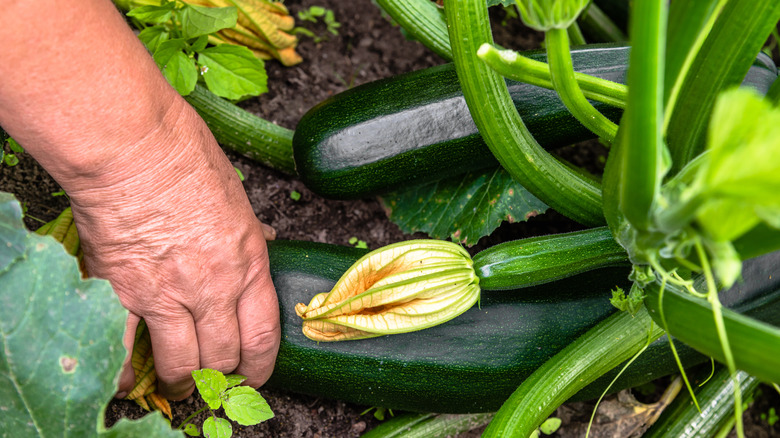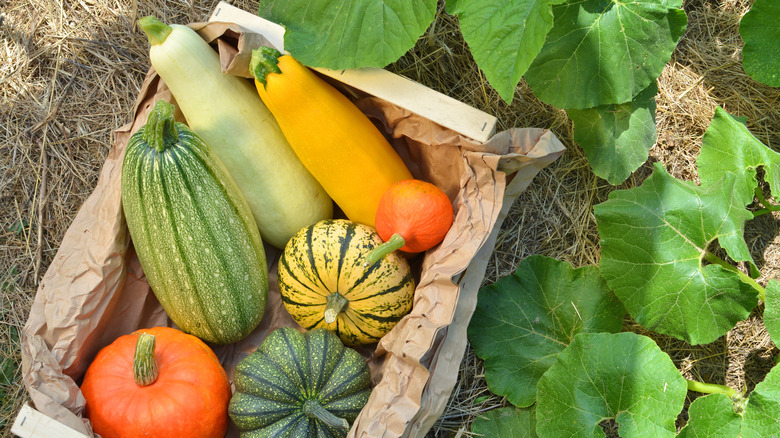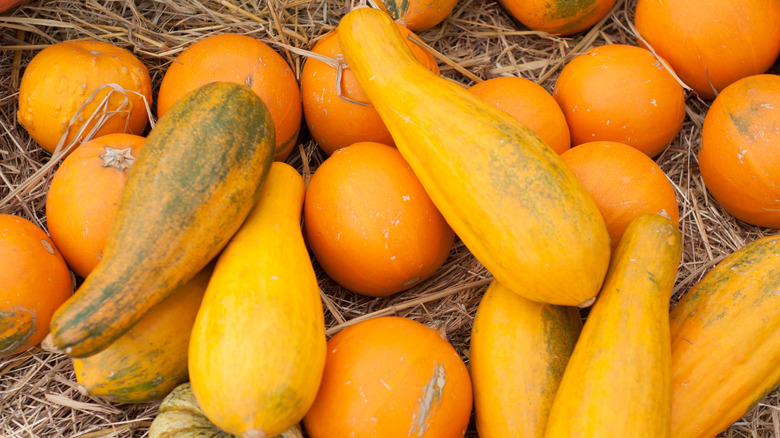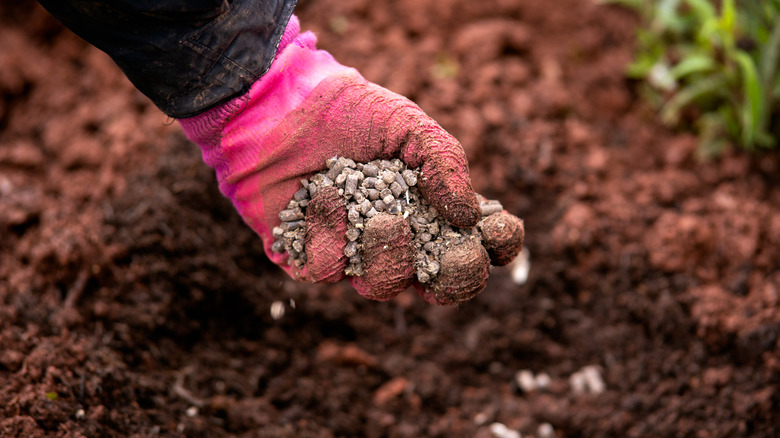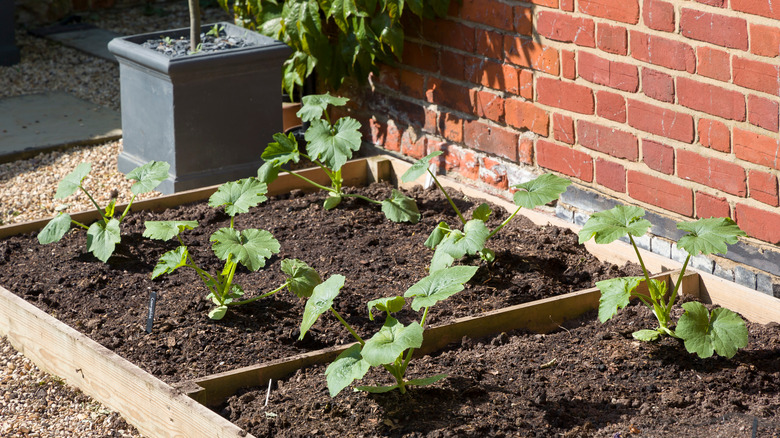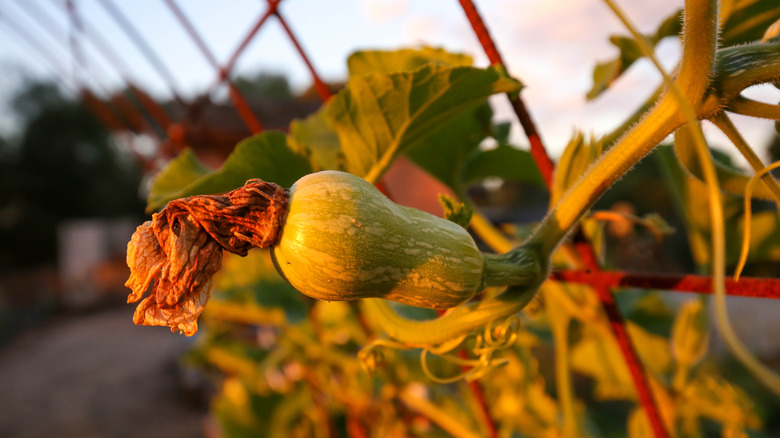Mistakes Everyone Makes When Planting Squash
If you're hoping to impress the neighbors with a huge harvest and a basket full of fresh and free veggies, then squash seeds should certainly make the list when prepping for your beginner garden. Squash — particularly zucchini, which is a summer squash often found in the yards of aspiring gardeners — is known for being a simple vegetable that yields great results, both in the garden and on the dining room table.
As a matter of fact, The Old Farmer's Almanac named summer squash as one of the top 10 easiest veggies to grow straight from the seed. Given its popularity, squash often makes the cut for any garden newbie's plan for the season. But despite being one of the most common and simplest vegetables to grow, there's still a handful of mistakes that most gardeners — green thumb or not — tend to make when it comes to planting squash.
Don't plant squash as the wrong time of year
Summer and winter squash both help make a mean Sunday night dinner — did someone say stuffed zucchini boats? — but when it comes to growing the two, they aren't completely comparable. It may seem obvious, but gardeners might gloss over the whole "summer" and "winter" thing, which means selecting a seed that may not be fit for the current weather, and therefore, it may not be a successful crop.
Maintaining different varieties of squash can also get confusing, explains the Gardening Channel. Since winter squash can withstand, and even perform well in lower temperatures, the threat of frost isn't imminent. Winter squash can be ready after about 100 frost-free days, but summer squash shouldn't even be planted until the sun is steadily out. That's because summer squash needs adequate sunlight and regularly warm temperatures of at least 70 degrees fahrenheit in order to thrive (which, hey — us too, honestly).
Don't harvest your squash at the wrong time
According to the Gardening Channel, summer squash only takes about two months to be ready to harvest, whereas winter squash may need a bit more time since it's typically planted under significantly different temperatures and conditions. Harvest to Table suggests waiting until about two weeks into spring, and always after the last frost, before planting your squash. But one common mistake isn't just nailing down the timing on when to plant squash — it's about when to pick it!
Summer squash is ready to be picked early on when it's tender, which many naive gardeners tend to mistake as too soon. If you wait, that's when you end up with a ridiculously overgrown zucchini (a common gardening blunder we've all been through once or twice). Winter squash, however, will be ready to pick once it's fully matured. Take a quick look at the rind of the squash — if it's hard to the touch, not shiny, and almost muted looking, then chances are it's actually ready to hit the cutting board!
Don't forget to add this to the soil
All good vegetables start in the soil, and either variety of squash is certainly no exception. Squash in particular are known to grow substantially large, and in order to do so, they need additional nutrients from the soil. A common mistake is not giving these strong feeder plants enough to go off of from the soil alone. Stoney Creek Farm Tennessee says that these "hungry plants" need more than just the basics — you'll want to mix in some compost or manure in your soil to make it as nutrient-dense as these popular plants require. While squash is generally easy to grow, you'll have to provide just the right conditions in order to get the perfect harvest.
HGTV also says it's key to keep a close eye on the moisture level of the soil. Since squash requires direct sunlight and the plants tend to suck the nutrients out in no time, you may find that your squash plant looks dry and wilted now and again. While it's typical for squash leaves to wilt due to the heat, it may also be indicative of dry soil. Try packing in some mulch under the base of the plant early on, explains the network. This will help retain some additional moisture, and avoid one of the most common squash oversights before it's too late.
Don't overcrowd your squash
Most new gardeners tend to think more about the smaller details (like what to plant when, and when to pick what, and which of your neighbors deserves that giant zucchini you so proudly grew) as opposed to the bigger picture. That's why the overall layout of your garden is a regular oversight when it comes to planting squash, but it's easily avoidable when you stay one step ahead with a bit of research!
The Gardening Channel says that since squash are typically such "heavy feeders," they require a significant amount of space. You'll want at least three feet of separation all around: between each row, and each individual squash plant. Additionally, it's fair game to plant squash next to lower maintenance options like tomatoes or corn, but definitely don't accompany your squash plant with some potatoes — since the two plants both require so many nutrients, one is bound to be a loss next to the other. If you're planting winter squash, definitely do so far away from pumpkin seeds, too (via The Spruce). The two can cross-pollinate and ultimately cause more of a headache, when all you wanted was a relaxing afternoon in the garden!
Prepare for any pests or animals
Now that you've nailed down the proper timing, spacing, and soil techniques to grow squash, it's time to gear up for the inevitable: animals and insects, just waiting to ruin your hard work (and future dinner plans). Unfortunately, an animal-destroyed harvest is an all too common scenario that most gardeners encounter each season, but the biggest mistake here? With the right prep and planning, it's actually pretty avoidable!
One option is to use tall plant stakes or trellises to help grow your squash up off the ground, so they aren't as accessible to any rodents. If you find that bugs are a considerable issue, try floating row covers to keep your squash contained (per Harvest to Table).
According to HGTV, bird netting is another little-known secret to preventing any unwanted gnawing on your squash. The network explains that squirrels seek moisture from growing plants, especially in times of little rain, and the sad truth is that squash are large and easily accessible options for any thirsty critter. Bird netting doesn't keep out the little pests and insects, but it will stop the squirrels right in their tracks, so always include it early on in the season to protect your crop!
